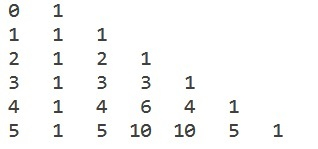
 Data Structure
Data Structure Networking
Networking RDBMS
RDBMS Operating System
Operating System Java
Java MS Excel
MS Excel iOS
iOS HTML
HTML CSS
CSS Android
Android Python
Python C Programming
C Programming C++
C++ C#
C# MongoDB
MongoDB MySQL
MySQL Javascript
Javascript PHP
PHP
- Selected Reading
- UPSC IAS Exams Notes
- Developer's Best Practices
- Questions and Answers
- Effective Resume Writing
- HR Interview Questions
- Computer Glossary
- Who is Who
C program for Binomial Coefficients table
Given with a positive integer value let’s say ‘val’ and the task is to print the value of binomial coefficient B(n, k) where, n and k be any value between 0 to val and hence display the result.
What is Binomial Coefficient
Binomial coefficient (n, k) is the order of choosing ‘k’ results from the given ‘n’ possibilities. The value of binomial coefficient of positive n and k is given by
$$C_k^n=\frac{n!}{(n-k)!k!}$$
where, n >= k
Example
Input-: B(9,2) Output-:
$$B_2^9=\frac{9!}{(9-2)!2!}$$
$$\frac{9\times 8\times 7\times 6\times 5\times 4\times 3\times 2\times 1}{6\times 5\times 4\times 3\times 2\times 1)\times 2\times 1}=\frac{362,880}{1440}=252$$
What is Binomial Coefficient Table
The Binomial Coefficient Table is formed for calculating the multiple values that can be generated between n and k.
Example
Input-: value = 5 Output-:

Approach used in the below program is as follows −
- Input the variable ‘val’ from the user for generating the table
- Start the loop from 0 to ‘val’ because the value of binomial coefficient will lie between 0 to ‘val’
-
Apply the formula given, if n and k is not 0
B(m, x) = B(m, x - 1) * (m - x + 1) / x
- Print the result
Algorithm
START Step 1-> declare function for binomial coefficient table int bin_table(int val) Loop For int i = 0 and i <= val and i++ print i Declare int num = 1 Loop For int j = 0 and j <= i and j++ If (i != 0 && j != 0) set num = num * (i - j + 1) / j End print num End print
Step 2-> In main() Declare int value = 5 call bin_table(value) STOP
Example
#include <stdio.h>
// Function for binomial coefficient table
int bin_table(int val) {
for (int i = 0; i <= val; i++) {
printf("%2d", i);
int num = 1;
for (int j = 0; j <= i; j++) {
if (i != 0 && j != 0)
num = num * (i - j + 1) / j;
printf("%4d", num);
}
printf("
");
}
}
int main() {
int value = 5;
bin_table(value);
return 0;
}
Output


